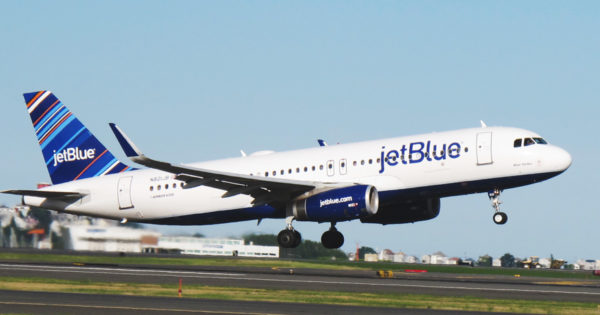
Despite priding itself on being a challenger brand, JetBlue Airways has joined most other major U.S. airlines in offering a Basic Economy fare.
Announced last year but officially launched today, the airline’s Basic Blue category is aimed at budget-conscious travelers who are willing to make a few compromises—though not as many as on some other airlines.
Travelers paying the Basic Blue fare won’t be able to cancel or change a flight, and will be the last group to board their plane. They can still pick their seat, but not until 24 hours before their departure time. They are still allowed to bring a carry-on and personal item without extra charges.
“We are broadening the appeal of each fare tier so that there is truly something for everyone,” said Joanna Geraghty, president and COO of JetBlue, in a statement. “Our new low fare will be anything but basic, designed to help customers save while still offering the full JetBlue experience.”
JetBlue follows in the footsteps of United Airlines, American Airlines and Delta, which was the first U.S. airline to introduce Basic Economy fares back in 2012. All four generally have the same limitations, though United only allows Basic Economy passengers to bring a personal item; it charges extra for a carry-on.
“It’s certainly become an industry standard, at least in the U.S.,” said Brett Synder, an aviation and airline expert. “The main idea was to find a way to compete for the really price-sensitive traveler. … If you really only care about price, we can accommodate you. But you’re going to sacrifice a lot to get that fare.”
According to JetBlue, all of its customers, no matter the fare they pay, will continue to get access to the amenities the airline is known for including free wifi, DirecTV and the most legroom in economy class.
The rise of Basic Economy over the past several years comes as budget airlines like Frontier, Spirit and Allegiance continue to compete by turning previously standard features like extra legroom and carry-on bags into a la carte amenities.
JetBlue specifically competes with Spirit in its hub of Fort Lauderdale, Fla., where Spirit is based.
United and American expect to generate about $1 billion in additional revenue from cabin segmentation like Basic Economy. (Worth noting is both airlines are four times the size of JetBlue.)
Last year, JetBlue reported a net income of $487 million.
The one airline that doesn’t offer a basic economy ticket is Southwest. An industry outlier, the company has also traditionally offered free checked bags to travelers. It has maintained this policy even during the grounding of the 737 Max 8, which makes up more than 5% of its fleet.
“It makes it tougher for airlines like [Southwest] to remain price competitive,” Snyder said. “They don’t have extra checked bag revenue to offset a lower fare.”
https://www.adweek.com/brand-marketing/jetblue-new-basic-economy-class-basic-blue/

